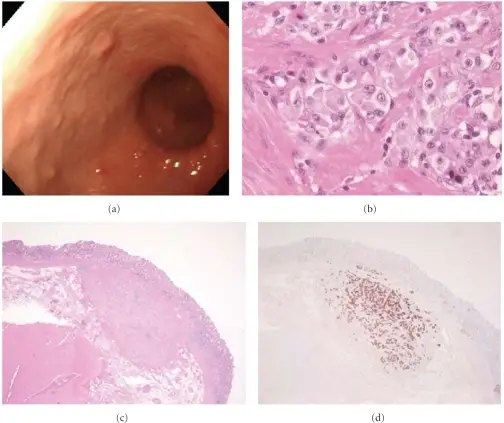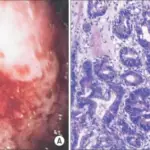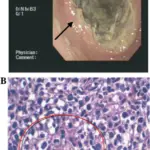Gastric carcinoid tumors are rare tumors that develop within the gastric mucosa. They can present as an isolated lesion or there can be multiple lesions. The tumor can invade locally into deeper structures of the gastrointestinal GI tract wall.
What is the Pathology of Gastric Carcinoid Tumor?
The pathology of gastric carcinoid tumor is:
-Etiology: The cause of gastric carcinoid tumor is caused by mutations in genes. The develop In neuroendocrine cells.
-Genes involved: MEN1 and MEN2 mutations.
-Pathogenesis: The sequence of events that lead to gastric carcinoid tumor are: In response to persistent achlorhydria, G cells in the gastric antrum undergo hyperplasia, secrete more gastrin and hypergastrinaemia results. Approximately, 5% of patients with autoimmune chronic atrophic gastritis will develop a gastric carcinoid tumour.
-Histology: The histology associated with gastric carcinoid tumor shows sbnormal glands with neoplastic cells.
How does Gastric Carcinoid Tumor Present?
Patients with gastric carcinoid tumor typically women present at age range of 55 to 65 years. The symptoms, features, and clinical findings associated with gastric carcinoid tumor include: diarrhea, abdominal pain, vomiting, nausea, rectal bleeding, rectal pain.
How is Gastric Carcinoid Tumor Diagnosed?
Gastric carcinoid tumor is diagnosed by blood and urine tests, levels of 5-HIAA in a urine sample collected over 24 hours, blood tests for chromogranin A and gastrin.
How is Gastric Carcinoid Tumor Treated?
Gastric carcinoid tumor is treated by excision endoscopically or surgically, Antrectomy, by eliminating the trophic effect of gastrin, radiation therapy, chemotherapy, and hormone therapy.
What is the Prognosis of Gastric Carcinoid Tumor?
The prognosis of gastric carcinoid tumor is good. Carcinoid tumors usually grow slowly over many years. Surgically treated patients with carcinoid tumor have an overall favorable 83% 5-year survival rate.



